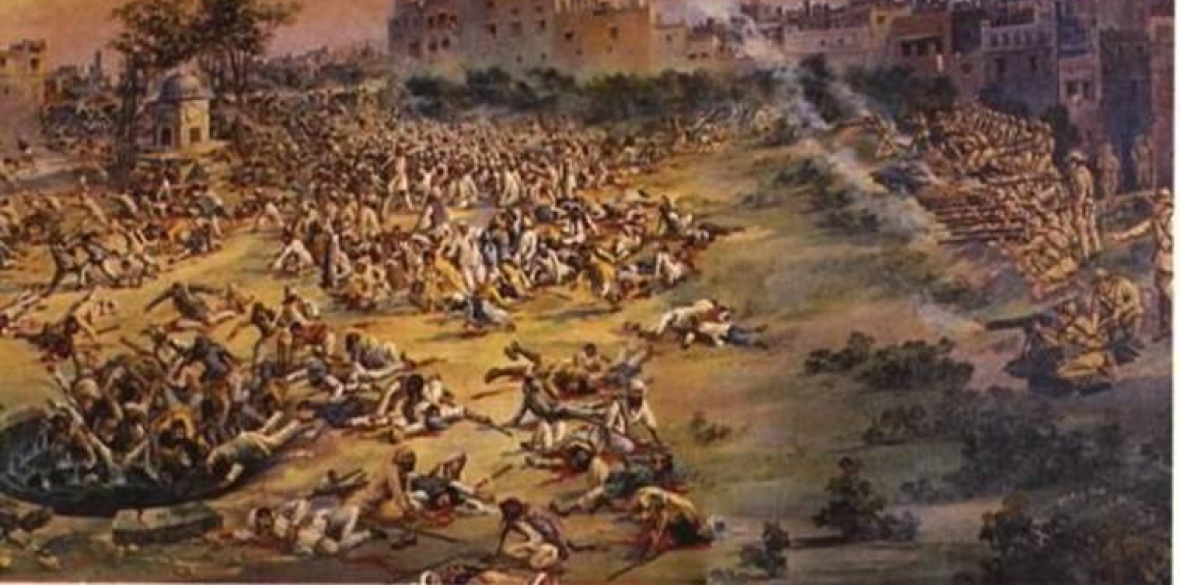This is the last article you can read this month
You can read more article this month
You can read more articles this month
Sorry your limit is up for this month
Reset on:
Please help support the Morning Star by subscribing here
I FIRST heard about the Jallianwala Bagh massacre when I was about 10 years old through my family and friends and people at the Sikh temple.
That was in the 1970s. When I went to India aged 21 in 1982, I visited the site. This reinforced a feeling of anger and sadness at the price the Indian people paid to the British empire for their “nerve” in demanding independence.
The British empire, after World War I, wanted to stamp its flagging authority on all subject peoples — whether in Egypt, China, Ireland or India.
At Jallianwala Bagh, they did that with racist humiliation, forcing Indians to bow and crawl before British officers, who beat up random victims and finally unleashed their bullets. British colonialism’s bullets didn’t discriminate between Muslims, Hindus and Sikhs.
Over 1,000 were murdered and thousands injured for life in that square, from where no escape was possible.
It was deliberately planned. There was no provocation from the people — just indiscriminate firing into a packed crowd. Daring to support independence was enough for them to be included in the British empire’s murderous act of intimidation aimed at all the Indian people.
Now is the time for a formal apology by the British government to the Indian people. Past governments have apologised for slavery, the Irish famine, Bloody Sunday and Hillsborough among other atrocities.
The present British government must dissociate itself and the British people from this massacre. The British people no longer want this massacre hanging round their necks.
What was done by the government of 1919 supposedly in their name must now be undone by the British government of 2019 clearly in their name.
A hundred years of British government shame has to be ended for both the Indian and British people.
For communities from the Indian subcontinent in Britain — and indeed for all ethnic groups from old colonies — an apology recognises them as an integral part of Britain, and a part that is here to stay.
Because an apology undermines the racist legacy of the British empire that we are still suffering from today.
The make-believe nostalgia for the empire when “everything was all right and all was white” has reared its head again in the EU referendum. An apology will give confidence to our resistance to such racist self-deceit.
To improve understanding in the future about the horrors of colonialism, the Jallianwala Bagh massacre must feature strongly in schools’ curriculums.
Should we be educating children into thinking the British empire, without any self-interest, spread enlightenment and civilisation to the “coloured” world? Shouldn’t we be placing Jallianwala Bagh at the centre of British empire history — along with the opium wars in China, forced labour and segregation in Africa, mustard gas in the Middle East, starvation in Bengal, the Black and Tan atrocities in Ireland?
Nor was the empire a golden era for the British workers. The savagery of the employing class at the appearance of trade unions and electoral and social reform movements is well-documented. But not well known. Why is it that only now public notice fastens on the Peterloo massacre because of a recent film?
Perhaps the British government and the ruling class realise a potential problem — one apology can open many other cans of worms.
It can reveal the brutal acts of imperialist class power were not an accident, but a necessary component dealt out to all and sundry, in Britain and in the colonies. That’s another good reason to force through an apology for the Jallianwala Bagh massacre.
The century committee, which was established by the Indian Workers Association and includes trade unions across political parties and other like-minded organisations, is strongly campaigning to put pressure on the government to apologise.
In the CWU, our branch has submitted a motion to the CWU black workers conference and also the national CWU conference in April.
I have also requested other colleagues in other unions to take up the campaign as well as raising the issue in my own and other Asian communities in south Wales. I am confident we will get an apology, even if it isn’t in time for the centenary in April — the campaign will not stop in April.
To sign the petition calling for an apology for the Jallianwala Bagh massacre visit mstar.link/JallianwalaBagh.











